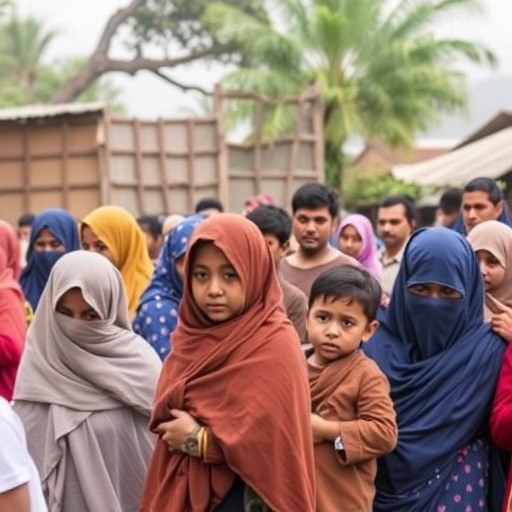The dire situation facing the Rohingya population demands urgent and sustained international intervention, as a recent scholarly analysis elucidates the complex and tragic interplay of sovereignty, nationalism, and systemic violence in Myanmar. The study underscores the perilous crossroads at which the Rohingya stand: either forced repatriation to an environment marked by deep-rooted repression or indefinite displacement in overcrowded refugee camps—both outcomes equate to what the author terms “social death.” This grim reality exposes not only a humanitarian crisis but also systemic failings that continue to threaten regional stability.
The Rohingya crisis, far from being a mere consequence of ethnic conflict, is deeply entwined with Myanmar’s state-building process. Since the 1970s, policies steeped in an exclusivist nationalist ideology have systematically ostracized the Rohingya, portraying them as the antithesis of the nation’s Buddhist-majority identity. This process of “othering” has been institutionalized through repressive legislation and state-sanctioned violence, producing a coercive sovereignty that marginalizes and ultimately seeks to expel the Rohingya community. The analysis highlights how Myanmar’s legal framework has been weaponized to strip the Rohingya of their citizenship and fundamental rights, perpetuating their exclusion and vulnerability.
Professor Klejda Mulaj’s commentary delineates how nationalism, underpinned by Buddhist-majority endorsement, has solidified a narrative that justifies the persecution of the Rohingya. The state’s exercise of sovereignty manifests as a “negative expression” in this totalitarian context, where identity politics intersect with violent enforcement of homogeneity. This has resulted in cascades of violence escalating towards genocide, characterized not only by physical atrocities but by the systematic erosion of dignity and legal identity. The Rohingya’s plight thus reflects a broader crisis of governance and identity within Myanmar’s political architecture.
The international community’s response, as the study points out, has been inadequate and sometimes counterproductive. Cuts to humanitarian aid exacerbate the suffering within refugee camps located in Bangladesh, where deplorable conditions foster further insecurity. The analysis urges international actors to intensify diplomatic engagement with both Dhaka authorities and Myanmar’s emerging political figures in Naypyitaw and Sittwe, insisting that aid must go beyond charitable relief. Instead, there must be concerted pressure on Myanmar’s rulers to acknowledge historical injustices, halt extortionate practices against the Rohingya, and facilitate their rightful citizenship and safe, dignified return.
Critically, the analysis stresses that any repatriation initiative absent guarantees of human rights and citizenship is both impractical and dangerous. Myanmar’s ongoing hostility and exclusionary state policies preclude any meaningful reintegration without systemic reform. The Rohingya’s status as a persecuted minority cannot be disentangled from the structural frameworks of nationalism and sovereignty that have historically denied them legal personhood. Thus, their predicament must be understood as inherently political, demanding solutions that address state behavior rather than merely humanitarian symptoms.
The study also explores the broader regional implications of Myanmar’s treatment of the Rohingya. By deepening societal fractures, exclusion and violence against one group risk triggering wider instability. Violence once directed at the Rohingya has begun to metastasize into aggression against other marginalized groups, threatening Myanmar’s internal cohesion and regional peace. This underscores the urgency for international stakeholders to perceive the crisis not in isolation but as part of a complex web of identity, governance, and security challenges.
Significantly, the research highlights the role of non-state actors, including the Arakan Army, in this dynamic landscape. It posits that constructive dialogue facilitated by international actors between such groups and Rohingya representatives could foster protection of human rights and pave the way toward political solutions. These efforts would need to reconcile the Rohingya’s right of return with the realities of current sociopolitical tensions, emphasizing inclusion over exclusion in Myanmar’s fraught nation-building process.
Professor Mulaj poignantly remarks that the Rohingya genocide is among the defining tragedies of contemporary global politics, with roots extending back over six decades of systematically orchestrated marginalization. The study calls for an educational campaign aimed at breaking international silence and neglect, which have allowed cycles of violence to persist with impunity. This approach calls for a reimagining of global responsibility—where knowledge, advocacy, and policy are mobilized to confront state-sponsored oppression and protect vulnerable populations.
Central to the analysis is the recognition that the Rohingya’s suffering constitutes a “human rights catastrophe” resultant from state ideology rather than spontaneous ethnic animus. Myanmar’s nationalism, shaped by historical narratives privileging Buddhist identity, has constructed a political environment where the Rohingya are portrayed as existential threats. This framing has legitimized exclusionary laws and violent actions, embedding persecution within the very fabric of state sovereignty and governance mechanisms.
The research further details how the relationship between legislation and violence operates in Myanmar, where discriminatory laws serve as mechanisms for systemic coercion. The abrogation of the Rohingya’s citizenship rights effectively renders them stateless, with no legal protections and subject to arbitrary violence. The study emphasizes this legal-violent nexus as a distinct feature of Myanmar’s governance, where law does not guarantee justice but rather enforces exclusion.
In light of these findings, the article advocates for a comprehensive international strategy combining humanitarian assistance, diplomatic pressure, and legal advocacy. It calls for a reassessment of sovereignty as a concept that must include responsibility towards minority populations and protection of human rights. The Rohingya crisis exemplifies how sovereignty, when used to justify exclusion and violence, becomes counterproductive, risking protracted conflict and regional destabilization.
Ultimately, the analysis implores stakeholders at all levels to recognize the Rohingya tragedy as emblematic of broader issues in global governance, human rights, and postcolonial state formation. Addressing it requires not only alleviating immediate suffering but fundamentally transforming the political ideologies and institutions that perpetuate exclusion. Only through such transformative engagement can the cycle of violence be halted, and a pathway toward justice and dignity for the Rohingya be forged.
Subject of Research: People
Article Title: Cascades of violence to genocide: sovereignty, nationalism and the predicament of the Rohingya of Myanmar
News Publication Date: 1-Jul-2025
Web References: http://dx.doi.org/10.1080/01436597.2025.2518595
References: Professor Klejda Mulaj, University of Exeter, Third World Quarterly
Keywords: Human geography, Human migration, Government, International relations, Political process, Sociopolitical systems, Society




